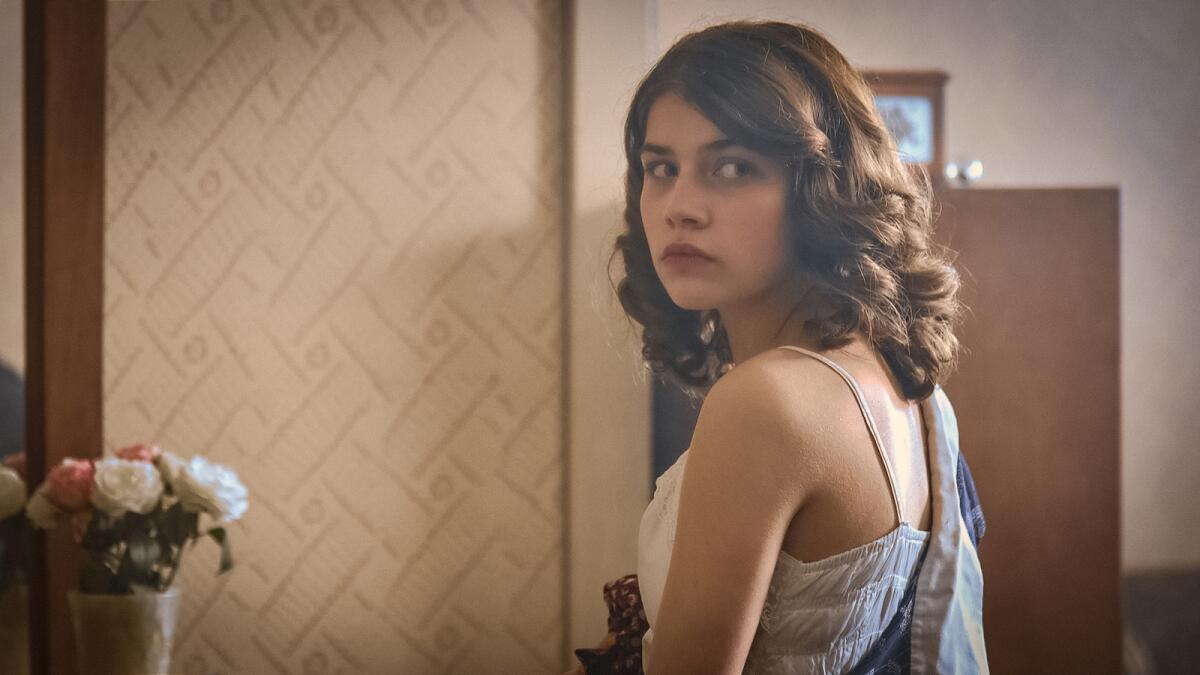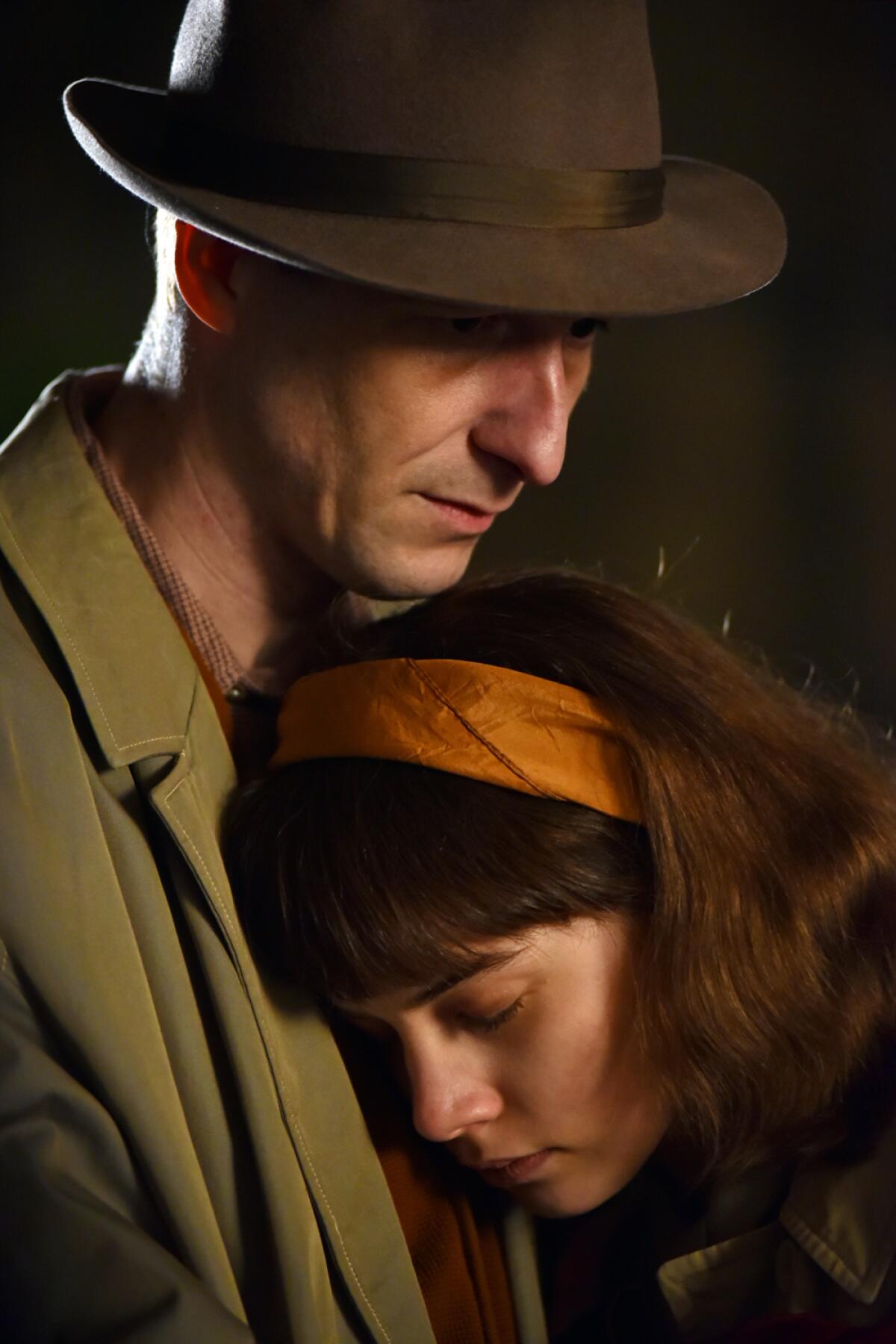Two souls find a path toward healing in the richly human ‘Those Who Remained’

- Share via
A solemn male doctor and an impetuous teenage girl find a hopeful bond, and a way back from loss, in the patient, tender Hungarian period drama “Those Who Remained.” Gently pitched to hold equal levels of hurt and promise, even as it deftly addresses the optics that are hard to ignore, Barnabás Tóth’s richly acted film exudes a faith in human connection as relevant today as such relationships needed to be in the years after World War II for survivors of unimaginable trauma.
Aldó, played by Károly Hajduk, is a wiry, disheveled figure with benevolent eyes and a haunted air, whose entire life is his ob-gyn practice since losing his family in the camps. When he meets angrily self-possessed 16-year-old patient Klára (Abigél Szőke), she’s coming out of a delayed puberty, still writing letters to parents whose absence she can explain away, and railing against life under her discipline-intensive, exasperated great-aunt Olgi (Mari Nagy).
But it’s already a sign of the sensitive hands we’re in — from the actors, the director and the editor — that when these generation-apart opposites lock eyes in the sterile atmosphere of an examination room, we know what’s passing between them isn’t some illicit spark, but the recognition of what binds them: presenting a brave front to an unjust world. Underneath her mask of old-soul scorn and his hollowed-out professionalism, they feel left behind, without a clear path forward.

That Aldó and Klára can talk to each other about such things, while showing a respectful attitude toward their individual emotional architecture — his paternally compassionate touch, her request for comforting hugs — suggests an open door to healing neither wants to shut; and which convinces Olgi to accept a co-guardianship with this cheerless but kind doctor. Of course, the fostering works in the other direction, too: Klára answering Aldó’s fatherly ministrations with a style of care and attention that — if not technically spousal — suggests a mature awareness for what has been wrenched from his life. (The scene where she’s given access to the photo albums he can’t look at anymore is quite moving, like the key to something sacred and unspeakable, as the glassine sheets between each page give off a crinkling fragility.)
That being said, there’s no getting around what even the least judgmental observer would wonder about, especially at a time when Communism is fomenting a new, appearance-driven severity. So it’s a relief to report that Tóth, co-adapting with Klára Muhi a novel by Zsuzsa F. Várkonyi, handles this intermittent tension — both what’s interior and unarticulated, and what’s externally threatening — with an appreciative subtlety, and without a hint of soapiness. Tóth nods cautiously toward a dignified ambiguity, what can exist in the molecules between vulnerable souls in the process of rebuilding.
Felix van Groeningen and Charlotte Vandermeersch’s first directing collaboration is a beautifully filmed and acted adaptation of Paolo Cognetti’s acclaimed novel.
The actors bring all the intelligence such heart-rending delicacy requires, too, as cinematographer Gábor Marosi foregrounds their faces in flatly lighted widescreen images evocative of a dimly lighted existence. With deep, melancholy eyes you can imagine inspiring a painter, Hajduk keeps Aldó’s sorrow ever-present, even in the hint of a smile; the way his worry for “Sunny” (Klára’s nickname) becomes a quiet engine in the film is a low-key master’s class. Szőke, meanwhile, is stunning in her first major film role, radiating bold, beyond-her-age smarts and heaving insecurity with flinty, take-charge magnetism — it’s light-years from the pathos-driven portrayals of Holocaust-scarred youths we so often get, but no less touching for how energetic it is.
As the narrative progresses, with the political winds chilling the air again, the watchfulness at the core of this true compassion is joined by a broader concern about who else is watching, what they see, and where that empathy-deficient vigilance might lead. In the exquisite, understated duet of healing that is “Those Who Remained,” however, it only imbues even more precious integrity on this kindred bond, presented with precision and thoughtfulness as an example of what truly meaningful custody of a human being looks like.
'Those Who Remained'
In Hungarian with English subtitles
Not rated
Running time: 1 hour, 27 minutes
Playing: Starts May 5, Laemmle Royal, West Los Angeles; Laemmle Town Center, Encino
More to Read
Only good movies
Get the Indie Focus newsletter, Mark Olsen's weekly guide to the world of cinema.
You may occasionally receive promotional content from the Los Angeles Times.









